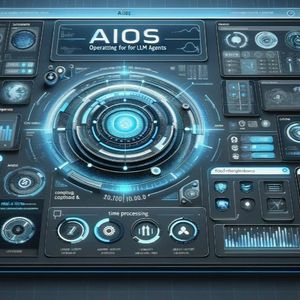How AI Operating Systems Can Replace Traditional Software and Transform Digital Workflows
3 min read
Computing, like many fields of human endeavor, evolves all the time. And so it stands to reason that despite their current ubiquity, dominant operating systems like Windows and macOS have a natural expiration date. And AI operating systems may be about to call time on their hegemony. While traditional operating systems rely on predefined rules, forcing users to wrestle with syntax or sift through settings like digital archaeologists, their AI-powered descendents promise to turn clunkiness into cruise control. With large language models (LLMs) embedded at their core, AI OSes let users simply say what they want, whereafter their commands are executed. In short, they’re analogous to brainy computing butlers. We often hear that AI is coming for our jobs, evoking images from I, Robot and countless other dystopian flicks about the dangers of tech. It’s more accurate, though, to say that AI will automate and optimize, happily handling the mundane manual tasks we all despise. While autonomous agents take care of the grunt work, a dedicated AI OS will be the beating heart of the system, coordinating the efforts of thousands – even millions – of enterprising drones. From Rigid Rules to Fluid Intelligence Traditional OSes are like old-school librarians – they’ll get you the book you want, providing you know the exact call number. An AI OS, though, doesn’t need structured commands: it can understand your voice, anticipate your needs, and spring into action straightaway. The best way to think about the two is that regular operating systems execute, while their AI counterparts intuit. The former has no autonomy, its architecture based on compliance with strict rulesets, while the latter enables agents to prioritize tasks, manage resources, and streamline even complex workflows. Negative takes on AI abound, but a positive case is just as easy to make. By automating routine processes – scheduling, data sorting, inventory management, payroll – AI frees up budgets for innovation, empowering the strategists and big brains to devote their time to more dynamic matters. In a sense, AI represents a lifeline for businesses toiling to stay on top of their daily operational workload. The AI OS in Action AI-powered operating systems aren’t some far-fetched idea; they already exist in the wild, and they’re worth studying to determine just how soon we might be saying Adios to the likes of Windows and macOS. Case in point Steve, the internal AI OS of Walturn , a firm specializing in Product Engineering as a Service (PEaaS). Developed to help Walturn’s engineers coordinate client projects, allocate resources, and reduce manual effort, Steve has been a runaway success, with CEO Hashim Hayat crediting it with achieving “marked improvements in client satisfaction as a result of faster delivery times and enhanced solution accuracy.” Hayat added that such hearty feedback encouraged Walturn to “scale AI OS adoption throughout our broader operational structure.” Web3 project SpoonOS is another excellent example. Described as an Agentic Operating System, it establishes an environment in which autonomous agents can perceive, reason, and execute an assortment of tasks – including those leveraging smart contracts like DeFi dApps. It also provides a convenient framework for those seeking to create, deploy, and manage such agents. Powered by the open-source Neo blockchain, SpoonOS’s architecture includes privacy-preserving tools, multi-agent coordination, and vector storage, as well as an orchestration engine that lets developers create agent-based apps with built-in fault tolerance and automatic recovery. The project also stores all agent data permanently on-chain, meaning there’s an auditable trail to every AI decision. The AI x blockchain segment is red-hot right now. Since January, AI-related on-chain activity has surged by 86% , hitting 4.5 million daily unique active wallets. That amounts to 19% of Web3’s total – putting it neck-and-neck with gaming at 20%. AI agent projects have also raised $1.39B so far this year, up 9.4% on the total 2024 figure. Workflows Rewritten, Future Unlocked The emergence of AI OS isn’t about replacing long-established software, it’s about redefining work as we know it. By embedding human-like intelligence at the system level, these operating systems let small enterprises motor through their manual tasks and focus on sharpening their strategy. Done right, AI OS represents computing’s next frontier – predictive, human-friendly, and unstoppable. As for Windows and macOS, let’s enjoy them while they’re here. Disclaimer: This article is provided for informational purposes only. It is not offered or intended to be used as legal, tax, investment, financial, or other advice.

Source: Crypto Daily



